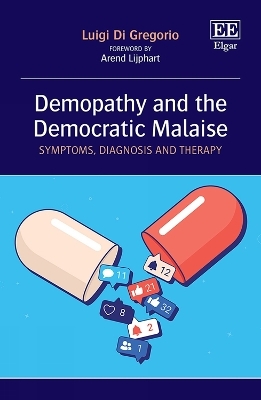
Demopathy and the Democratic Malaise
Symptoms, Diagnosis and Therapy
Seiten
2021
Edward Elgar Publishing Ltd (Verlag)
978-1-80088-150-1 (ISBN)
Edward Elgar Publishing Ltd (Verlag)
978-1-80088-150-1 (ISBN)
This unique book presents original concepts to characterize the current crisis of democracy. Offering a comparative study of original electoral data and analysis of contemporary trends, models and theoretical frameworks, Luigi Di Gregorio argues that democracy is affected by ‘demopathy’; it is sick and is in need of therapy.
Luigi Di Gregorio explores how democratic malaise derives from the transition to postmodernity and the rise of individualization: the loss of social meaning, the end of meta-narratives, the crisis of knowledge and cognitive authorities, narcissism and new perceptions of time and space. The author argues that mass media and technological innovations are the main drivers of this change and have heightened the logic of the consumer society. The resulting psychological democracy is that of a permanent ‘pollcracy’, whose leaders are simply pursuers of public opinion. The book concludes that democracy must be defended by building a positive narrative to counterbalance the effects of these trends.
Taking a multidisciplinary approach, this book will be critical reading for scholars and students of political science, political sociology, political theory and political communication and marketing. Its broad perspective paints a big picture that will also be beneficial for political consultants and policy analysts.
Luigi Di Gregorio explores how democratic malaise derives from the transition to postmodernity and the rise of individualization: the loss of social meaning, the end of meta-narratives, the crisis of knowledge and cognitive authorities, narcissism and new perceptions of time and space. The author argues that mass media and technological innovations are the main drivers of this change and have heightened the logic of the consumer society. The resulting psychological democracy is that of a permanent ‘pollcracy’, whose leaders are simply pursuers of public opinion. The book concludes that democracy must be defended by building a positive narrative to counterbalance the effects of these trends.
Taking a multidisciplinary approach, this book will be critical reading for scholars and students of political science, political sociology, political theory and political communication and marketing. Its broad perspective paints a big picture that will also be beneficial for political consultants and policy analysts.
Luigi Di Gregorio, Lecturer of Political and Public Communication, Department of Humanities, Communication and Tourism, Tuscia University, Italy
Contents: Foreword 1. Introduction to demopathy and the democratic malaise PART I SYMPTOMS 2. The contemporary crisis of democracy. Symptoms of the democratic malaise PART II DIAGNOSIS 3. The origin of the crisis. Individualized modernity and the narcissist syndrome 4. The communication and image society. The driver of the narcissist syndrome 5. Demopathy. Public emotion, pollcracy, followship PART III THERAPY 6. Towards a democracy of the imaginary. An evolutionary perspective 7. (Covid) Afterword Index
| Erscheinungsdatum | 14.07.2021 |
|---|---|
| Verlagsort | Cheltenham |
| Sprache | englisch |
| Maße | 156 x 234 mm |
| Themenwelt | Sozialwissenschaften ► Kommunikation / Medien ► Kommunikationswissenschaft |
| Sozialwissenschaften ► Politik / Verwaltung ► Politische Systeme | |
| Sozialwissenschaften ► Politik / Verwaltung ► Politische Theorie | |
| ISBN-10 | 1-80088-150-9 / 1800881509 |
| ISBN-13 | 978-1-80088-150-1 / 9781800881501 |
| Zustand | Neuware |
| Haben Sie eine Frage zum Produkt? |
Mehr entdecken
aus dem Bereich
aus dem Bereich
Eine Einführung
Buch | Softcover (2022)
Springer VS (Verlag)
27,99 €
Buch | Softcover (2024)
Springer Gabler (Verlag)
49,99 €


